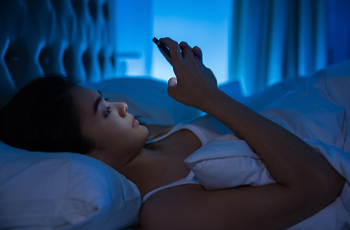
Work deadlines ... family responsibilities ... Instagram and Facebook feeds ... jogging, walking or taking the stairs ... visiting your out-of-state relatives ... hosting your book club ... channeling your inner green thumb. You lead a busy, active and fulfilling life.
So why sweat it if you lose a little sleep?
As it turns out, whoever said "you snooze, you lose," was wrong. Despite the perceived necessity or temptation to cut back on your z's, sleep is as important to your overall wellness as good nutrition and regular physical activity. In fact, chronic sleep loss is linked to poor work performance, relationship troubles and driving-related accidents. Studies have also shown it's a risk factor for depression, heart disease, diabetes and obesity.
Need more incentive to snooze? Getting quality sleep offers many eye-opening benefits, such as:
- Boosting your immunity
- Decreasing your risk of chronic conditions like diabetes and heart disease
- Taming stress
- Enabling you to maintain a healthy weight
- Improving your mood and memory
- Enhancing your energy level and concentration
What About Menopause and Poor Sleep?
Are you finding that hot flashes or symptoms of menopause/perimenopause are keeping you awake at night, or otherwise wreaking havoc on your sleep? If your sleep problems are persistent, first and foremost, talk to your doctor. He or she can evaluate the underlying causes of your slumber struggles, and depending on your health, diagnosis and personal wishes, can provide medications (e.g., hormone replacement therapy, low-dose antidepressants, low-dose birth control pills) or a referral to a sleep specialist who can help you rest easier.
For better sleep, you should also consider these lifestyle strategies:
- Develop a ritual. Leave the stress of the daily grind behind by developing some type of pre-sleep ritual (e.g., reading a book, meditating or taking a cool shower before getting into bed). This ritual can be as short as 10 minutes or as long as one hour. Stick to a consistent sleep schedule, too. That means doing your best to go to bed and get up at the same time every day, even on weekends.
- Surrender the Starbucks. Avoid drinking beverages containing caffeine after noon, if at all possible. (Keep in mind: both caffeine and alcohol can trigger hot flashes in some women.)
- Drink alcohol in moderation. Alcohol can cause symptoms that disturb sleep, such as nightmares, sweating and headaches. To reduce these symptoms, don't drink alcohol before bedtime or make sure to practice moderation.
- Work it out. Research has shown that regular exercise helps people sleep better. However, timing matters. Don't exercise two to three hours before bedtime, as that can also disrupt sleep.
- Create the ideal sleep environment. Do whatever you need to do to create the ideal sleep environment—from turning down the thermostat to wearing only breathable cotton sleepwear to using a fan. Remember, your bed should be used for sleep and sex only.
- Tone down technology. Don't make cell phones, tablets and computers part of your bedtime ritual. The blue light emitted by these devices, as well as your TV, stifles the production of melatonin, the hormone that controls your sleep/wake cycle. Less melatonin means more difficulty falling and staying asleep. So be sure to power down your electronics at least two hours prior to bed.